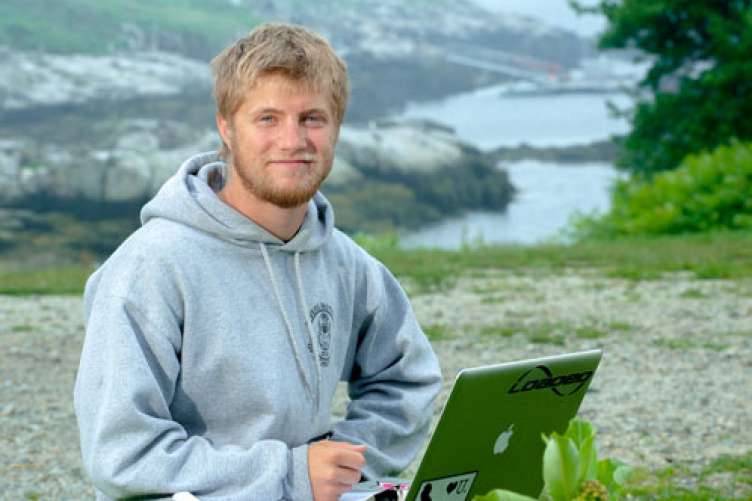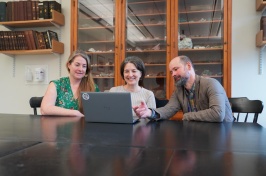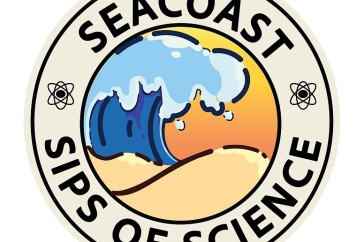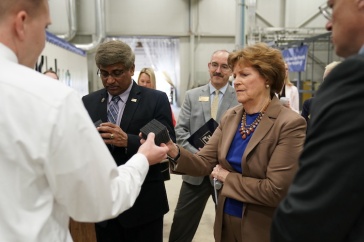
On an island seven miles off the New Hampshire coastline in the midst of one of the soggiest summers in memory, worrying about enough water seems counter-productive.
But for Dimitry Harris ’14 it’s a job. Harris, a mechanical engineering major from Durham, snagged one of four sought-after sustainable engineering internships at Shoals Marine Laboratory on Appledore Island this summer. For four weeks in June and July, he and his colleagues worked with SML staff to bring sustainable solutions to the essential systems taken for granted on the mainland – generating power, supplying fresh water, and eliminating waste.
Harris, along with two engineering students from Cornell University, which shares oversight of SML with UNH, and one from Ohio State, tackled nine projects during this year’s internship. They ranged from seemingly simple projects, such as quantifying the relative advantages of paper towels over hot-air hand dryers in the bathrooms, to wider ranging, complex problems like projecting the life span of the batteries that store energy from the island’s “green grid” or increasing the fresh water supply.
Harris says the 95-acre Appledore Island is the ideal test site for his emerging interest in sustainable engineering. “All these systems are small enough that you can wrap your head around them. It’s all scaled down and easier to understand,” he says.
Scaled down, perhaps, but the stakes are higher. On the self-sufficient island, which generates its own power via solar, wind, or a diesel-powered generator, sustainable technology is not just a feel-good notion, it’s a matter of comfort and survival.
“Everything affects everything else. That’s what’s so great about this environment as a learning experience,” says Ross Hansen, SML director of facilities and planning and leader of the internships.
This summer, the weather has had a major effect on the island’s water supply, charging its well and groundwater stores. Nonetheless, four of the interns’ projects concerned water: both conserving what is used and discovering new sources of fresh water. The lab’s fresh water currently comes from a dug well and a cistern; a reverse-osmosis machine desalinates sea water when those sources run dry, but it requires running a generator powered by costly fuel.
Harris’s work included tracking the depth of the water in the well and doing a draw-down test to see how quickly the well charges itself. “It’s the first really big study of this well,” says Hansen, adding that the well has provided Appledore guests with water since the hotel era around the turn of the 20th century.
Harris also helped evaluate the life span of the bank of batteries that stores energy from the island’s “green grid” of solar panels and a wind turbine. That grid is about to get a boost, as a new energy conservation building covered in solar panels will harvest additional power from the sun, making the interns’ analysis important to the efficient running of the green grid.
SML has hosted engineering interns since 2006, when UNH alumnus Mike Dalton ‘64, the retired president of Unitil Corporation, spearheaded its creation and funding. He and Unitil engineers remain involved in the program, as do UNH faculty: Environmental Research Group professors Nancy Kinner, Jim Malley, and Robin Collins have all visited the island to consult with the interns.
Hansen calls the interns’ work a valuable contribution to the island’s robust sustainability efforts, which have cut in half the gallons of diesel fuel the island uses to run its generator. “They do a lot of the legwork, looking at the data, analyzing it, putting it in spreadsheets,” he says. “It saves us a lot of time.”
And past intern projects have led to tangible change on the island: The students’ work saved a seawater pump from being replaced, led to the installation of composting toilets, and vastly improved acoustics in the once-deafening Kiggins Commons dining area.
“They nailed it. Now you can have a conversation in Kiggins,” says Hansen.
For their parting project, Harris and his fellow interns shared what they learned about sustainable Shoals at a “rock talk” for the island’s community of students and researchers. “People who are here for the first time, they take things for granted,” says Harris. “The goal is to raise awareness. I don’t think too many people know what goes into turning on the faucet and brushing their teeth.”
Originally published by:
UNH Today
-
Written By:
Staff writer | Communications and Public Affairs





















































